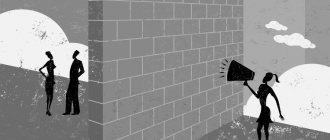Fear of people - how to get rid of it?
Despite the fact that man is a social being and cannot survive without society, despite the fact that from childhood he is surrounded by people with whom he learns to communicate and build relationships, many never master this skill. And the need to communicate causes them such fear and gives them such mental anguish that they become recluses so as not to once again subject themselves to painful trials. “The only true luxury is the luxury of human communication,” wrote Antoine de Saint-Exupéry. But it is not available to them.
Fear of communication arises for various reasons. Some people have this mental disorder - social phobia. For social phobes, at the mere thought of the need to “go out in public,” their hearts begin to pound furiously, their hands and voice tremble, they break into a sweat, feel sick, they turn red, turn pale, or fall into a stupor. Psychotherapists treat social phobias by prescribing psychotherapy sessions or medications.
People with low self-esteem and an inferiority complex also experience this fear. Someone once deprived them of self-confidence and instilled in them the idea that they were not beautiful, smart or good enough. Since then, they are afraid to be in the spotlight, so as not to become the subject of general discussion and, as it seems to them, a laughing stock. Their communication is mainly a narrow circle of friends, where they feel like fish in water.
People experiencing depression also avoid communication because they lose interest in everything that is happening around them and withdraw into themselves.
It is curious that the cause of fear of communication and social phobia is considered to be not only excessive sensitivity and weakness of character, but also excessive demands on the child or overprotectiveness of adults, as well as the communication paradox of double bind - a double message. The theory of this paradox was developed by the British-American scientist Gregory Bateson. The child, the victim of a double message, is given conflicting instructions by his parents and punished for not following them. He is invited to talk, but then criticized or ordered to shut up. Parents express love with their words, but their nonverbal behavior says otherwise.
What is the problem
Fear of people can manifest itself in different forms - from simple embarrassment when talking with a stranger to panic attacks when in public places.
It is very important to determine what exactly the problem is. Psychologists identify the following forms of fear of people:
- shyness;
- social phobia;
- anthropophobia.
Each of them manifests differently and is treated in different ways.
Shyness
Shyness is not a type of phobia. However, it has a lot in common with the fear of people. Parents, as a rule, do not see anything wrong with the fact that their child is afraid of strangers, is shy in a new team and tries in every possible way to avoid other people’s company. They perceive it as a character trait and do not believe that it needs to be dealt with. But in vain! This is what happens in adult life to an overly shy and shy person.
- It is difficult for him to start a family because he is afraid of meeting new people.
- He has practically no friends. His entire social circle consists mainly of close relatives.
- He doesn't know how to defend his opinion.
- He often becomes depressed, depressed and generally dissatisfied with his life.
- In stressful situations, he thinks unconstructively, becomes absent-minded and forgetful. Blames himself for everything.
- He develops stable muscle tension and stooping.
I strongly recommend that you watch a course on how to communicate with people from the development project Wikium.ru. I myself took several courses there, the programs are excellent, the material is presented very well. If you don't like the course, watch the simulators.
As you can see, it is extremely difficult for a shy person to live a full and happy life. Shyness brings many problems and is the cause of missed opportunities.
Social phobia
Social phobia is one of the most common anxiety disorders. Each of us has experienced its unpleasant symptoms at least once in our lives.
The first signs of social phobia may appear in childhood and then intensify during adolescence. A person suffering from social phobia behaves as follows when talking with people:
- nervous;
- does not look the interlocutor in the eyes;
- answers with difficulty and reluctance;
- trying to end the conversation as quickly as possible.
He is uncomfortable working in a large team. He is frightened not so much by the people themselves as by the need to communicate with them. Criticism, negative assessments and judgments, ridicule - this is what a social phobia is afraid of. It is because of the fear of being rejected, misunderstood or ridiculed that a person avoids public speaking and any communication with strangers. At the same time, he willingly communicates with relatives and friends and feels calm in their company.
Anthropophobia
Anthropophobia is translated from ancient Greek as “fear of people.” It is considered a neurotic disorder in which a person seeks to avoid the company of people in all possible ways. An anthropophobe may be afraid of:
- a certain person;
- a group of people who share a common characteristic (nationality, hair color, profession, etc.);
- absolutely all people – both those he knows and strangers;
- crowd.
At the moment, more than a hundred varieties of fear of people have been identified. Among them are the following forms:
- Dentophobia – fear of dentists;
- coulrophobia – fear of clowns;
- xenophobia - fear of strangers, foreigners, strangers;
- gerontophobia – fear of older people;
- Pogonophobia is the fear of bearded people.
As you can see, the objects of phobias can vary greatly, and this makes diagnosing the disease difficult.
When an anthropophobe is close to the object of his fear or even just sees him, he begins to experience hostility, anxiety, and severe stress. In especially severe cases, a panic attack develops. These signs distinguish anthropophobia from social phobia, where the object of fear is the attention, attitude and evaluation of people, and not themselves.
Famous people suffering from anthropophobia
Celebrities who have been diagnosed with a fear of people:
- Johnny Depp is afraid for his family, worried that someone will harm his children.
- Stefan Ditko avoids interviews and communication with fans.
- John Hughes thought that others were laughing at him and deliberately trying to offend him. As a result, he left the cinema and locked himself in his house.
- Bill Watterson, at the peak of his career, got tired of communication, began to be afraid of it, and suddenly disappeared.
- Daniel Day-Lewis rarely appears in films, does not communicate with fans, and prefers solitude in the mountains.
- Britney Spears avoids and is afraid of annoying fans and does not accept gifts from them.
Some celebrities have never been able to figure out how to stop being afraid of people. They ended their careers and devoted their lives to solitude.
Symptoms of being afraid of people
The feeling of anxiety and panic that occurs when approaching an object of fear is the main symptom of anthropophobia. In addition to this symptom, the following behavior is characteristic of a person suffering from a fear of people.
- He refuses the offered help of strangers, even if he finds himself in a life-threatening situation. At the same time, he himself will never ask anyone for help.
- He tries in every possible way to avoid contact with any people, even with relatives.
- Refuses profitable employment only because the work involves communicating with people. Most often he works remotely or does not work at all.
- He leaves the house only as a last resort. At the same time, he chooses deserted streets and times when there are few people on the street, for example, very early in the morning.
- It is typical for him to perform the same type of repetitive actions. For example, he shakes his leg, taps his fingers on the table, walks aimlessly around the room, talks to himself, shakes his head, snaps his fingers, etc. The purpose of these actions is to relieve tension.
- Afraid to look people in the eyes.
When in direct contact with an object of fear, a person suffering from a fear of people experiences the following somatic symptoms:
- increased sweating;
- cardiopalmus;
- difficulty breathing;
- pain in the stomach, head;
- impaired body coordination;
- trembling, etc.
Fear of people has 3 stages, differing in severity.
- Easy – a person can cope with his fear on his own. When experiencing a feeling of anxiety, for example, before going to the store, he still pulls himself together and calms down.
- Medium – upon accidental contact with an object of fear, a person experiences a panic attack, aggression may appear or, conversely, tearfulness, and somatic reactions of the body develop. The patient is unable to control his fear.
- Severe – a person stops all communication with people, even with family. He practically never leaves the house, preferring to remain isolated from society. This form of the disease can only be cured forcibly.
Are you familiar with the symptoms and forms of fear of people described above? If yes, then it's time to get rid of the phobia. Any treatment begins with a correct diagnosis. And also by admitting to yourself that a problem exists and needs to be solved. The next important step is to determine the reason why people are afraid.
Improve yourself
The popular fear of rejection can be overcome by improving your own attractiveness in the eyes of the opposite sex, thereby reducing the likelihood of being rejected. Attractiveness consists of the following components:
- External characteristics.
Everything is clear here: train in the gym for about a year, get a fashionable hairstyle, dress stylishly. - Voice and speaking ability.
Develop confident intonation, make your voice strong, and your diction clear. Regular vocal and stage speaking classes will help. - Non-verbal.
Gestures, facial expressions, posture, glances. We offer non-verbal communication training or an acting tutor. - Erudition.
Reading good literature.
You can get everything at once by enrolling in the Benefis School of Theater Arts. There they train their voice, teach them how to use intonation, diction, read and send non-verbal signals, and help broaden their horizons. The only thing you have to do separately is train in the gym.
Causes of phobia
Fear of people most often develops in childhood. The reasons that provoke the development of a phobia are:
- excessive demands from parents on the child;
- upbringing in harsh authoritarian conditions, accompanied by cruel punishments;
- excessive criticism;
- humiliation from classmates;
- shyness and low self-esteem;
- forced restriction of communication with other people.
In such situations, the child develops the attitude that he is safe only when alone with himself. He can't trust anyone but himself. This attitude remains with him during the transition to adulthood. Subconsciously, he is afraid of disgracing himself and being punished, because since childhood his parents have convinced him that he is doing everything wrong.
The cause of anthropophobia can be the suffering experienced from unrequited love, betrayal, and painful relationships. In this case, the person is afraid to experience this pain again. Therefore, he deliberately avoids communication and getting close to people.
Ways to deal with fear of people
There are 3 main ways to combat a phobia:
- drug treatment;
- psychotherapy;
- self-help.
The choice of treatment depends on the severity of the fear of people. Mostly the methods are used in combination. Treatment is carried out only as prescribed by a specialist and under his supervision.
Drug treatment
This method of getting rid of fear of people uses:
- antidepressants;
- tranquilizers;
- sedatives.
These drugs suppress anxiety and improve mood. But since they are addictive, they take them in courses. After stopping the drug, the fear returns again. These medications alone cannot cure people's fear. However, they help a person to better perceive psychotherapy, make him calmer and more adapted to interacting with society.
Prescribing them yourself is strictly prohibited! Otherwise, the situation may worsen sharply. Only a competent specialist has the right to prescribe potent antidepressants. He also monitors the patient’s condition and conducts appropriate psychotherapy.
Psychotherapy
This is the most effective way to combat a phobia. However, not every anthropophobe is able to find the strength to turn to a psychotherapist. After all, a doctor is also a person. In severe forms of phobia, treatment must be carried out forcibly. The following methods are distinguished in psychotherapy.
- Psychoanalysis is a rather lengthy process that helps a person find the true cause of the fear of people and get rid of it forever. This method is suitable for those who cannot independently determine the cause of the phobia. Especially if its roots are in early childhood. In particularly difficult cases, hypnosis is used to identify the cause of fear and eliminate negative attitudes.
- Cognitive behavioral therapy is a method that perfectly helps people who know very well the reason for their development of anthropophobia. Most often, such people develop a phobia in adulthood. The psychotherapist lives with the patient in situations that traumatize him. Then the specialist identifies incorrect attitudes that create fear in the patient’s mind. At the last stage, he teaches a person to cope with his fear.
- Paradoxical intention is a radical method of dealing with fear that gives the fastest results. A person must want to do something that he is very afraid of. In other words, to get rid of fear, you need to consciously do what scares you the most, namely contact with people. You need to start with small steps. For example, first, ask a passerby what time it is. This method is very effective, but it is not suitable for everyone.
- Group therapy is a method in which people suffering from anthropophobia learn to interact with each other. Patients, working in a group, train social skills and the ability to communicate with other people. They develop the attitude that people do not pose a danger, but, on the contrary, are capable of providing help, support and giving positive emotions. In such groups, it is easier for the patient to experience frightening situations, such as meeting people, speaking in public.
Self help
This method can be effective in complex therapy of anthropophobia and social phobia and as an independent way to combat shyness.
First of all, psychologists advise understanding and accepting the following guidelines.
- People are selfish by nature. Each person is busy only with thoughts about himself, so your problems or shortcomings most often do not interest them at all. They most likely don’t even notice the moments that make you complex.
- Your attitude towards yourself is transmitted to the outside world. People around him pick it up. Therefore, love yourself! Praise your loved one for your successes and don’t blame yourself for your mistakes.
- You can't please absolutely everyone. And that's okay. All people are different, each has their own interests and tastes. Nothing catastrophic will happen if you get rejected. Try to accept the word “no” calmly. It's not scary at all. There are a huge number of people on the planet. And you will definitely find a wonderful companion for yourself.
- You have the right to make mistakes. It is impossible to learn anything without making mistakes.
Awareness and acceptance of these attitudes is an important step towards getting rid of excessive shyness and mild forms of social phobia. But theory without practice does not work. The next step is practical exercises. Here's what to do.
- Learn breathing techniques and simple relaxation methods that will help you quickly calm down . Similar techniques are described in detail in books on psychology. One of them is called the “rule of four” and helps restore breathing. You need to inhale for 4 counts, hold your breath for 4 seconds, exhale for 4 counts and hold your breath again for 4 seconds.
- Chat and meet new people . Easier said than done. But by overcoming yourself, you become more confident and brave in communicating with people. During a conversation, pay more attention to your interlocutor, what he says, how he reacts to your phrases. Drive away all sorts of thoughts like: “what if I look funny,” “oh, it seems I’ve been stupid again,” etc. Don’t engage in soul-searching. Focus on the conversation.
- Overcome fear gradually . Most people with phobias prefer an avoidance strategy. After all, it is much easier to close yourself off from what you are afraid of than to consciously overcome your fear. So make a list of 10 situations that you are afraid of getting into. Go through them, starting with the easiest one.
- Attend online support groups . There are many communities on the Internet where people share their fears. In return they receive words of support and approval. It helps you understand that you are not alone. And people are mostly friendly.
- Work on negative thinking . In moments of anxiety, negative thoughts arise in the head, for example, “everyone sees that I can’t do this and they laugh at me.” These thoughts need to be tracked and the attitude changed. Instead, you should think: “People are nice to me, and I’m doing the best I can, and that’s enough.”
- Play sports . Physical activity has a positive effect not only on the body, but also on the human soul. Your well-being improves, happiness hormones are produced, and stress goes away.
These are not all the ways to combat shyness and fear of people. You will see even more effective methods in the next video. I highly recommend watching it.











